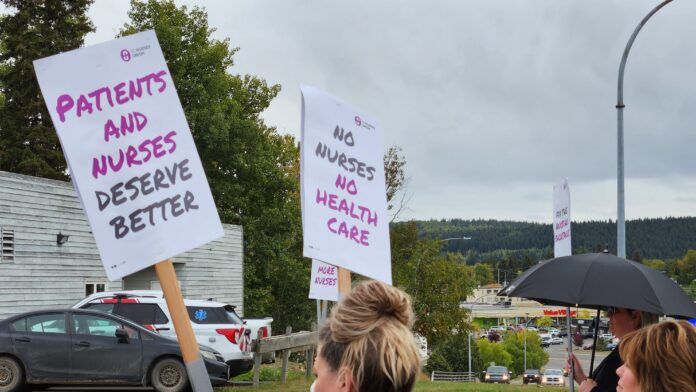“Rural and remote communities are disproportionately affected by some of the issues we are facing right now.”
That’s from BC Nurses Union President Adriane Gear after a consensus was reached on a nurse-to-patient ratios with the province during the Union of BC Municipalities Conference in Vancouver.
The implementation will start this fall and include emergency rooms, neo-natal intensive care units, post-anesthesia care units, maternity units, operating rooms, and alternative level of care areas.
However, Gear told Vista Radio once nursing staff numbers improve, this will make a difference.
“We are not going to grow nurses on trees overnight. It takes a minimum of two years to educate an LPN, a minimum of four years for an RN and then when you think about being emergency room qualified – there is some additional training.”
“It gives the nursing profession some hope and also a plan to get us there. Ultimately, ratios is what is best for patients, there is better care provided, reduced mortality rates and, reduced lengths of stay in hospital.”
Earlier this week, District of Vanderhoof Mayor Kevin Moutray tabled the health care challenges his area is facing – communities such as Fraser Lake, Fort Saint James and Vanderhoof are currently 26 LPN’s short between those three communities.
With that in mind, Gear noted northern communities are suffering just as much if not more from this on-going health crisis.
“If one nurse is sick or god forbid takes vacation, – the system is so stretched that it might trigger a temporary closure for example. Big urban areas are struggling with not having enough nurses but the impact on rural and remote communities is so much more significant.”
“What we can’t lose sight of is there are nurses that have continued to show up each and everyday through the pandemic and in this time – it’s taking a real toll on my members and all health care workers. Employers still could be doing so much more to respect nurses and retain them.”
The full suite of minimum nurse-to-patient ratios will be implemented over a four-year period, with a target of hiring more than 8,000 nurses.
The BC Government has previously marked $300 million to build out the nursing workplace with actions and initiatives such as:
Something going on in the Prince George area you think people should know about?
Send us a news tip by emailing [email protected].
- Launching an international recruitment campaign targeting internationally educated nurses;
- Offering recruitment incentives of as much as $25,000 for accepting positions in high-need areas;
- Expanding the province’s public travel nurses program, to reduce reliance on agency nursing and overtime;
- $100 million allocated from the 2023-24 minimum nurse-to-patient ratio budget to support retention and professional development for nurses, focusing on emergency departments in year 1;
- The BCNU and province will work together to create resources to implement flexible scheduling as part of establishing collaborative and healthy workplaces.






